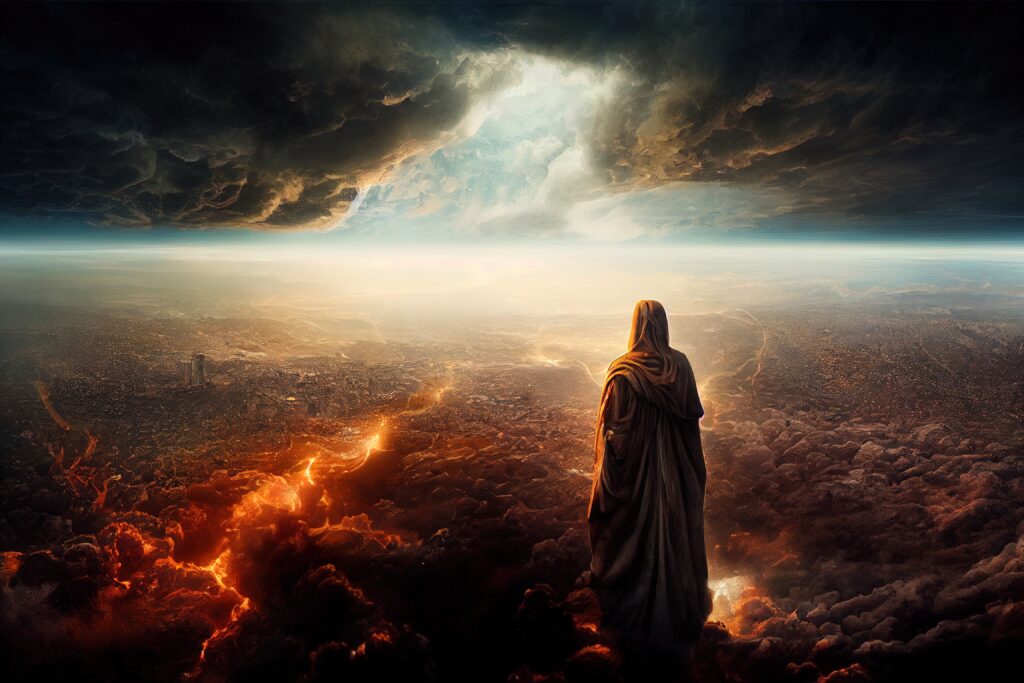
The Seven Thunders.
“And he gave a great shout like the roar of a lion. And when he shouted, the seven thunders answered. When the seven thunders spoke, I was about to write. But I heard a voice from heaven saying, “Keep secret what the seven thunders said, and do not write it down.” – Revelation10:3,4.
Revelation 10 had opened with another mighty angel descending from heaven, robed in a cloud, with a rainbow above Him, a sunlike face, and legs like fiery pillars. The imagery used to describe this angel is that used to describe God: compare the language with that used in Exodus 13:21,22; 24:15,16 and 33:9,10, where God appears to Israel as a pillar of cloud and of fire, and also compare Ezekiel 1:27,28, where the cloud and the images are used to describe God’ presence. This same imagery is applied to Jesus. However, this being is labelled “a mighty angel”, a title never given to Jesus. He behaves like the man in Daniel 10-12, who talks to Daniel as the representative of God and Micheal the prince. Daniel sees a man in linen with a gold belt, flaming eyes, a face like lightening and the legs of burnished bronze – like the imagery of God in Ezekiel, and Revelation.
It would appear that this angel, is the fully accredited representative of Jesus.
In v3 John experiences the seven thunders and finds much in them that he would like to record, but he is told not to write them down. The thunders evidently reveal matters that are not yet ours to know. The hidden things belong to God alone (Deut. 29:29). No matter how much we study, no matter how brilliant we may be, we know only in part until Jesus comes (1Cororinthians 13:9). We should be candid about our limitations of understanding and not speak dogmatically about matters that are not certain.
Particularly in Revelation, many teachers of prophecy like to fill in too many details on which the text does not directly comment. Prophetic speculation often takes the place of obedience to the clear teachings of the Word. Instead of hearing and obeying the text, we use the Bible to satisfy people’s curiosity about the future. In so doing we add to the message of Scripture (Rev. 22:18).
The trumpets had focused on the unsaved (Rev. 9:4,20,21), but the “interlude” during the 6th trumpet (10:1-11:13) focuses on God’s people. It is part of the 6th trumpet. While the forces of evil are gathering for the final crisis (Rev. 9:16), the forces of God’s people are gathering to counter them (Rev. 7:4,1-0:1-11:13)
Many put the blame of the world’s troubles and even terrorism on religion. In the words of a protest sign: “No Religion, No War.” But would the elimination of religion make the world a safer place? A more tolerant place? History offers a resounding “no” to both questions. The architects of the French Revolution and Russian Communism both saw the intolerance of the “Christian” West and sought to solve the problem by eliminating the Christian faith. But the reaction against religion tends to create a new exclusion that breeds more violence in the future. The atheistic regimes of the 20th century exterminated more people than the Catholic church did in 1200 years of papal supremacy. There premise: it is better for everyone to believe as we do!
I believe that in a terrifying world we don’t need less faith but better faith. We don’t need less spiritual guidance; we need better spiritual guidance. Instead of “no sacred texts” we could start with a lot more humility in how we handle sacred texts. The very greatness of the God envisioned in the Bible warns us against the tendency to think we have gained absolute clarity in our understanding of Him.
